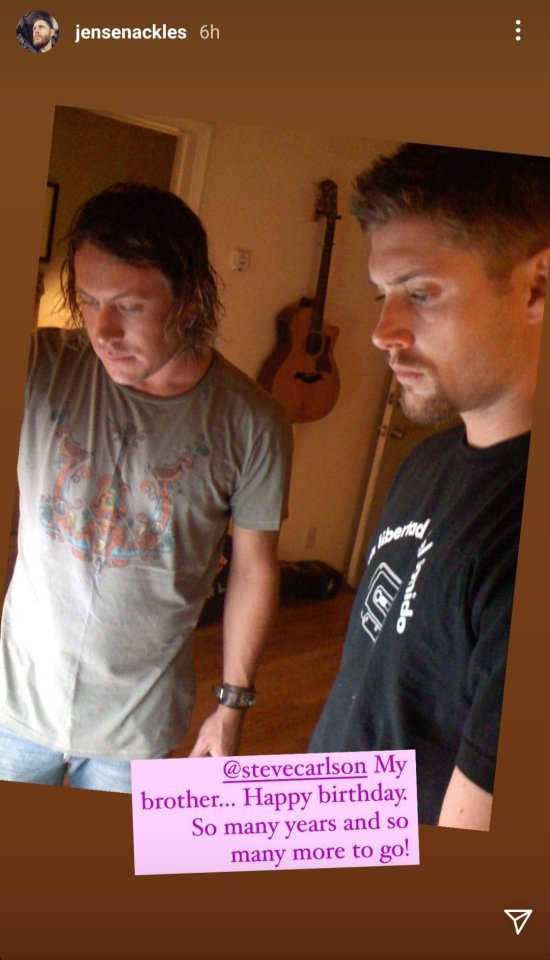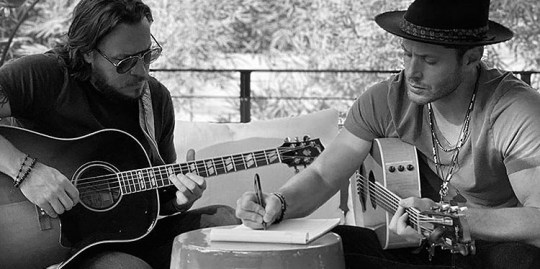#my tinhat is so tight it hurts
Text
I’mma tinhatting here for a moment, so if you have a weak stomach, please avert your eyes.
Concerning this post from Jensen on Aug. 7:

(Adjusting my tinhat firmly to my scalp): Unless Jensen not only wishes Steve a happy birthday every year on social media, AND ALSO includes a photo of both of them together every year in said post, I submit, your honor, that the motivation for Jensen to post this specific image and message is partially in response to the livestream with Misha and Darius yesterday.
Yes, I know, I’ve got a lotta nerve, because a birthday is a birthday, and to suggest any connection between Jensen’s post to his dear friend and Misha’s earlier livestream with his best childhood friend is preposterous tinhatting to the nth degree.
I’m just saying: If the public birthday wish and the PHOTO of them together are both a first, then I submit, your honor, that someone would like to remind someone that he too has his own close male friends other than you, buddy, thank you very much.
But that theory would only be justified, your honor, if JA has been proven in the past to have a jealous personality.
So: Jealous, or not jealous? You be the judge.
#my tinhat is so tight it hurts#Cockles is the reason#Jealous? Who's jealous?#Jensen's never been possessive of Misha a day in his life#Jensen is fine if other guys like Jared whisper in Misha's ear or touch him#or dance with him#like Matt Cohen or Sebastian Roche#I'm telling you he's not got a jealous bone in his body
18 notes
·
View notes
Text
Some Thoughts on “Dead to Rights” by Radio Company
First, if you are not a Cockles truther, you should probably look away. My tinhat is so tight it hurts. Surgical removal has been deemed too risky and would probably result in my demise.
The comments here are entirely mine, as are the assumptions incorporated into my lyrics analysis about real-life people and their relationships. No disrespect is intended. Please do not contact Jensen, Misha, or Danneel about anything you read below, or about anything Cockles-related, because there is absolutely no evidence for anything I am saying here, and their lives are essentially unknown to us.
Thank you.
_______________________________________________________________
She said
It all will change
If not it all can wait
It may die away
Over time
But I do believe
It's better than being alive
It's better than being alive
It's better than being-
Bombs away
Only just begun
You want to be the one to say you love
The rain-
fall
When all the while the angels call;
The only way to see just how it comes to be
Every day
To know it all falls away.
You had me dead to rights
Holding down my chain;
You had me dead to rights
I got out again;
Never been the same.
Song composed by Jensen Ackles and Steve Carlson

No official statement has ever been made by the two songwriters as to who wrote the lyrics, who wrote the music, or if words and/or music were composed by both. I am proceeding on the assumption that Jensen wrote the lyrics. He has mentioned writing lyric ideas on notepads (as shown in the above photo), and so indeed he gives much thought to his lyric-writing process.
In another track from Vol. 2, “City Grown Willow,” a song clearly written by himself, he uses “chain” imagery. Clearly, the concept of the chain resonates for him, whether the chain belongs to his lover, in “City Grown Willow,” or, as in this song, the chain is attached to himself, with the other end being held by the “she” he refers to throughout this lyric.
In addition, a close examination of other tracks by Radio Company share similar lyrical hallmarks as “Dead to Rights”: the invocation of a “she” in “City Grown Willow,” who I maintain is the same “she” as the one here, namely Danneel; “bombs away,” a metaphor for his emotional relationship with the “bomb,” i.e., Misha, recalls “cannonball, rise and fall,” from Vol. 1; other similar MC metaphors are the “fire” from “Jump into the Fire,” and “he stokes the flames ‘cause he is amused by the glow,” from “City Grown Willow.” Other JA lyrical hallmarks can be identified here as well.
________________________________________________________________
“’Dead to rights’ means having overwhelming evidence of someone's guilt, having irrefutable proof that someone is responsible for something. The idiom ‘dead to rights’ came into use before the 1850s in the United States.”
“’Dead to rights’: In the act of committing an error or crime, red-handed. For example, ‘They caught the burglars dead to rights with the Oriental rugs.’ This phrase uses ‘to rights’ in the sense of ‘at once.’”
________________________________________________________________
The theme of guilt is embedded in these lyrics--the narrator, JA, is guilty of something, and he was “caught red-handed,” as it were, by someone, the “she” in the song--his wife. The “guilty” act was more, I believe, her intuiting/noticing that her husband was in love with another--early days, perhaps before much had occurred between the two men, but wives are smart, and they can sometimes intuit when their men are in love with another, even before the husbands know themselves.
“She said”---This song focuses on the fact that the narrator’s wife notices instantly--”at once”-- the “act” for which he feels guilty. And she voices it to him--she knows he is in love with another. And she also knows who.
Thus, the “dead to rights” reference--she knew right away when her husband fell in love, and that he either wants to, or already has begun, pursuing a romantic relationship with his love. She “caught him red-handed,” even though a “crime” has not literally occurred, and, most importantly, *she is not angry or judgmental*; rather, she is concerned.
She has thought about it before she confronts him with it. She is philosophical: “It all will change”--that is, this could be a momentary fancy, and if you follow through, everything will change in your life. “if not”--that is, if this is something lasting and substantial--then “it all can wait.” What’s the rush? Why not cool your jets and see if you still feel the same way in a few months? And know too, if you do pursue this, “It may die away over time.” So be careful. Don’t jump into the fire. You could get burned. I don’t want that for you.”
What is his response to her words? He acknowledges to her: “You are right.”
He concedes that everything she says is true. But he has thought about it too. A lot. And he realizes something: “But I do believe it’s better than being alive.” This cryptic line puzzled me initially. “What” is better than being alive? Then one day, after hearing the track a few times, it hit: If the relationship crashes and burns--if it does die, and his heart is destroyed in the flames and ash--then so be it. He has decided that being with this person, jumping into the abyss with him, which could result in his own metaphorical “death,” is exactly what he will do, because “dying” from the possible fallout of a disastrous love affair is preferable to the agony of continuing to live without him.
“You want to be the one to say you love the rain.....fall” --I love the pause here, putting the emphasis on the “fall,” conjuring up the act of falling in love; and also, the possibility of falling to one’s death. And of course, the biblical “fall”--we’re all fallen from grace. He is reminding her that it is she who always says she loves the rain--metaphorically, the rainy days, the times when things aren’t necessarily all sunshine and roses. She understands and accepts life’s gifts and risks. (And we learn in “City Grown Willow” that, in fact, “Her faith in love is better on sunny days.”)
“When all the while the angels call”--I cannot emphasize enough how unequivocally this imagery refers to MC. If I have to explain how many times J has called M an “angel”.....The point being, the angel calling him is impossible for him to ignore, and he just plain doesn’t want to. When an angel calls your name................you go.
“The only way to see just how it comes to be”--a typical Jensen cryptic line, when he wants to say something but doesn’t want to be too revealing, so he does so with the utmost vagueness, to the point where his meaning is almost impossible to decipher. That cryptic line, combined with the rest of the verse, “Every day/To know it all falls away,” strikes me like this: “The only way to know if I should do it or not, is just to do it.” And in the end, he philosophizes, everything falls away in any case--”even you and I will someday be parted.” The idea of mortality--of the limited span of time we inhabit this life--is heavy on his mind. And again, he has made his decision: His love is so deep, so compelling, that he is willing to risk everything--heart and soul--to be with the angel who is calling him.
_______________________________________________________________
ADDENDUM TO MY POST:
Unless Steve Carlson has said publicly that he specifically wrote the *words* to City Grown Willow, I maintain steadfastly that Jensen composed the lyrics. It makes sense that Carlson had written the guitar piece itself, with its beautiful, cascading notes and striking chord progressions, which demonstrate his skill as an instrumentalist. It’s no accident that the recording itself features only Carlson’s playing, with no other instrumental accompaniment--probably exactly the way Jensen first heard it.
Jensen heard Steve play the piece, loved it, and proceeded to write words for it. When Carlson says he played this piece for Jensen and that he had written it years prior, I take that to mean that Jensen loved the sound of the guitar and wanted to work with it.--that the song had no words. The lyrics have the hallmarks of Jensen's writing style; the content fits his situation, with a female and 2 males as the protagonists; and HE is “the man from the mountains.” That’s not Carlson’s identity--that's a moniker Jensen deliberately chose for himself, as he makes clear in the music video.
If anyone can provide for me a direct quote from Carlson that he wrote the words, I will retract my statement. Until then, I hold my position.
#Cockles#Radio Company song#lyrics analysis is a love of mine#no offense is intended and I know nothing about anything#even cryptic lyrics can be deciphered#some people have tremendous grace and I love them#I will never as long as I live measure up to the greatness in these people's hearts
103 notes
·
View notes